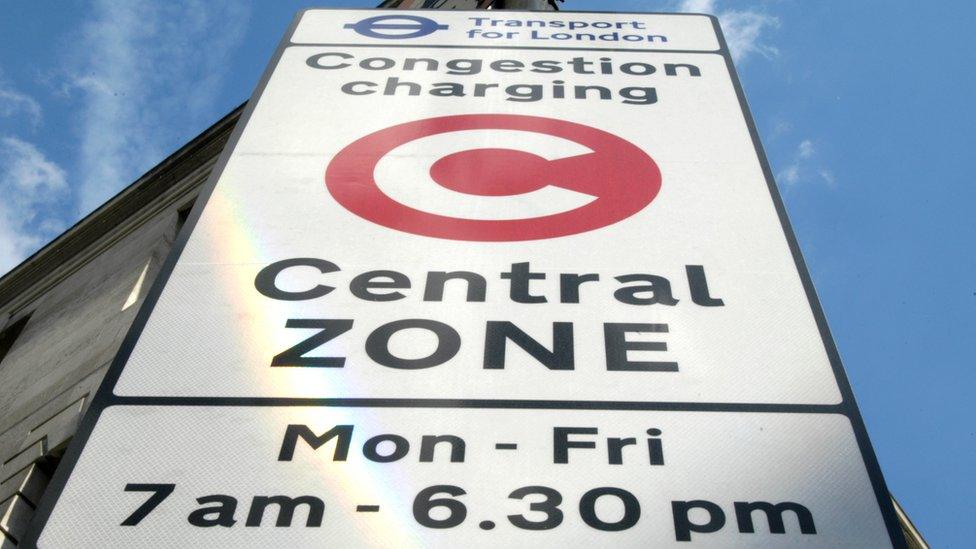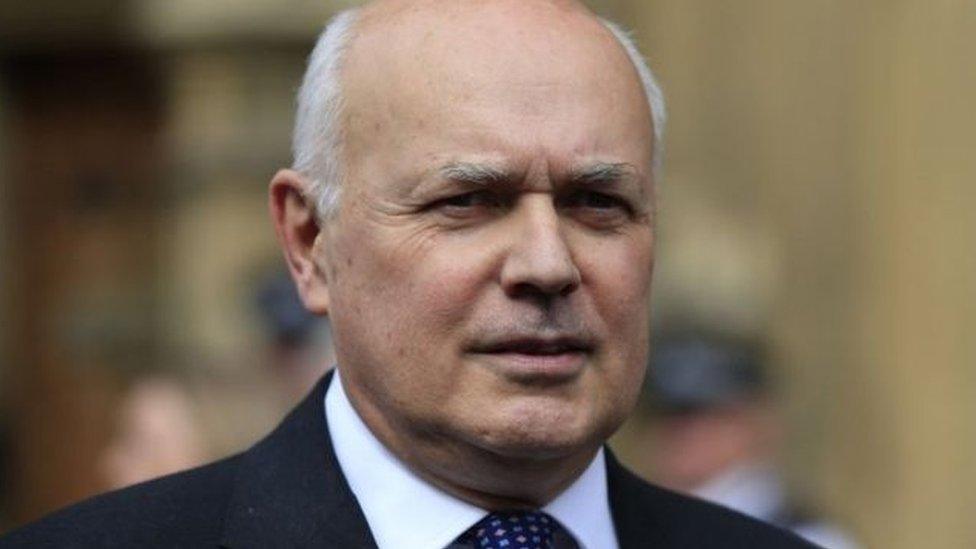Boris Johnson likens Irish border challenge to congestion charge
- Published
- comments
Boris Johnson compares Irish border with London boroughs
Boris Johnson has likened the challenge of avoiding a hard border in Northern Ireland to the boundaries between different boroughs of London.
The foreign secretary said it was a "very relevant comparison" because money was "invisibly" taken from people travelling between Camden and Westminster when he was London mayor.
London's congestion zone charge does not involve manual checks.
Labour said his comments were "typically facile and tactless".
The Irish opposition Fianna Fail party said it was "extraordinary" to suggest the two borders were the same, while the SDLP said: "Trivialising the very serious concerns relating to Ireland displays a dangerous ignorance that must be challenged."
The future of the Irish border after Brexit has been a key sticking point in talks so far.
The UK plans to leave the EU's customs union but wants to avoid border posts and physical checks between Northern Ireland and the Republic.
Mr Johnson, a former London mayor, told BBC Radio 4's Today programme there were "all sorts of things you can do" to achieve this.
"We think that we can have very efficient facilitation systems to make sure that there's no need for a hard border, excessive checks at the frontier between Northern Ireland and the Republic," he said.
"There's no border between Islington or Camden and Westminster... but when I was mayor of London we anaesthetically and invisibly took hundreds of millions of pounds from the accounts of people travelling between those two boroughs without any need for border checks whatever."
He added: "It's a very relevant comparison because there's all sorts of scope for pre-booking, electronic checks, all sorts of things that you can do to obviate the need for a hard border to allow us to come out of the customs union, take back control of our trade policy and do trade deals."

'Not a technical solution'
Analysis by the BBC's Mark Devenport

How literally should we take the Foreign Secretary's analogy? The collection of the London congestion charge relies on a network of automatic number plate recognition cameras which identifies motorists moving around the city.
However back in August last year, when the UK released a position paper on Northern Ireland after Brexit, government officials briefed journalists that a pledge to "avoid any physical border infrastructure in either the United Kingdom or Ireland, for any purpose (including customs or agri-food checks)" effectively ruled out plans for the installation of cameras near the border, or set back from it.
Instead the clear suggestion was that any technological fix would be more likely to involve firms becoming "authorised economic operators" and filling out customs forms from the comfort of the desks in their office HQs.
The BBC has asked for clarification of whether government policy has shifted on this point. But in the absence of a more detailed response we may note that Downing Street has told lobby correspondents that Mr Johnson "was not offering a technical solution" to the border issue.
Instead, the prime minister's spokesman clarified, "the foreign secretary was making a comparison to demonstrate our overall approach that the 110 million people crossing the border will continue living their lives as before, travelling freely just as Londoners cross boroughs every day".
That defence is not likely to appease Mr Johnson's critics, but it seems fair to say he was trying to get out of a tight spot during a wide ranging Today programme interview, rather than seeking to unveil a wholly new approach to the one set out in last year's position paper.

Labour's shadow Northern Ireland secretary Owen Smith dismissed the comments as "ludicrous".
And he accused Mr Johnson of "glibly dismissing the concerns of thousand of families and businesses who live and work along the border", adding that his remark "insults the intelligence of all who are worrying about how to resolve the border question after Brexit".
Irish MEP Mairead McGuinness, vice president of the European Parliament, also questioned the analogy. "The UK is a different country than the Republic of Ireland ... and therefore the comparison doesn't quite fit," she told BBC2's Daily Politics.
The foreign secretary's comments have also sparked a wave of reaction on Twitter:
Allow X content?
This article contains content provided by X. We ask for your permission before anything is loaded, as they may be using cookies and other technologies. You may want to read X’s cookie policy, external and privacy policy, external before accepting. To view this content choose ‘accept and continue’.
Allow X content?
This article contains content provided by X. We ask for your permission before anything is loaded, as they may be using cookies and other technologies. You may want to read X’s cookie policy, external and privacy policy, external before accepting. To view this content choose ‘accept and continue’.
Allow X content?
This article contains content provided by X. We ask for your permission before anything is loaded, as they may be using cookies and other technologies. You may want to read X’s cookie policy, external and privacy policy, external before accepting. To view this content choose ‘accept and continue’.
But former Conservative leader Iain Duncan Smith backed Mr Johnson.
"What Boris was saying was there are various ways in which you can manage things, like money transfers, checks on cars, checks on lorries - the technology now exists and is being used and is being developed around the world," he told BBC Radio 4's The World at One.
And DUP MP Sammy Wilson said a virtual border already exists.
"There's a different tax regime in Northern Ireland than the Irish Republic - VAT, excise duty is different - yet billions of pounds worth of goods cross that border, taxes are paid and not a lorry is stopped to check the goods because through virtual methods, through IT, through electronic invoicing, those taxes are collected by both the Irish government and the British government," he said.

Iain Duncan Smith says UK ports are already scanning non-EU goods in 'a matter of minutes'
The first draft of a legally-binding agreement between the UK and the EU, due to be published on Wednesday, is expected to address the issue of Northern Ireland.
The Dublin government says the option of Northern Ireland staying in full regulatory alignment with the European Union after Brexit should be included as a "backstop" - but this is opposed by some Conservative MPs and the Democratic Unionist Party.
Meanwhile former World Trade Organisation chief Pascal Lamy argued that whatever Brexit option was chosen "will necessitate a border" between Northern Ireland and the Republic, because checks will have to be carried out on goods and people.
Instead he suggested to the Commons Brexit committee a "Macau option" for Northern Ireland.
"You should think about giving to Northern Ireland the same autonomous trade capacity that China has given to Macau, which doesn't mean that Macau doesn't belong to China," he said.